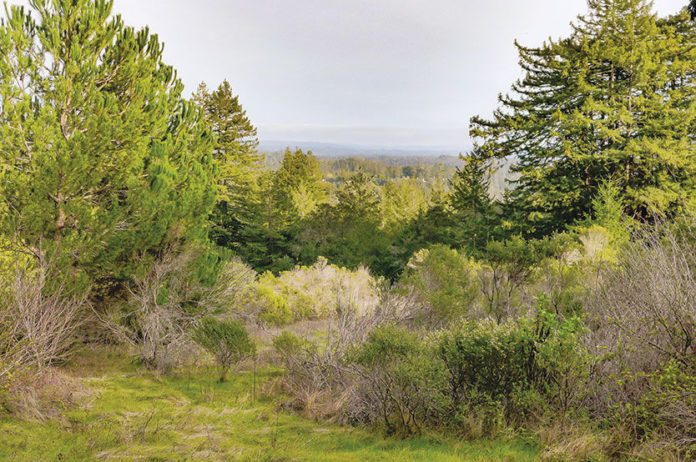We are lucky to live just over the hill from Santa Cruz—only an hour’s drive from cool summer air, seaside vistas and movies with fewer special effects and explosions. For years, I had heard about Pogonip, an open space near Santa Cruz, without really knowing what it was. I just knew it had a catchy name and trails to explore.
Pogonip is a City of Santa Cruz preserve that ranges across a 640-acre swath of hillside above town. The west side is bound by UC Santa Cruz, the east by Highway 9 as it starts its way to Felton. It boasts 8 miles of trails, some interesting history, and a couple spots that will lead you to say, “Only in Santa Cruz.”
I had heard rumors about drug dealing and homelessness in parts of Pogonip. The afternoon there was lovely except for the area around the Harvey West Park trailhead where we saw some sketchy characters and rolled up camping supplies a short distance up the trail. Don’t let that keep you away from Pogonip. Just choose another of the four trailheads all of which steer clear of this area.
Starting at Pogonip’s lowest elevation, we edged up and across the slope until we topped out onto a vast sprawling meadow that a century ago was the site of a golf course that drew the likes of Walt Disney, Mary Pickford, Darryl Zanuck and Spencer Tracy. A handsome lodge, now fenced off and decrepit, still stands as evidence of its elegant past.
We turned directly up the slope and onto the Spring Trail—easily the best path for a one-time visit to this preserve. It is a flat 1.6-mile trail that traverses the full length of the preserve alternating between cool forests and brighter mixed forests that occasionally open revealing a full view over Santa Cruz and the Monterey Bay. Today, the Spring Trail served as a link to the Spring Box Trail and attractions above.
In a silent setting, we reached a row of old lime kilns overgrown with ferns and redwood sorrel in stark contrast to the hubbub we would have seen here in the late 1800s. Back then, a steady parade of carts loaded with logs from the surrounding clear-cut hillsides fueled the kilns to provide lime—an ingredient in plaster and mortar—to supply the building furor in a bustling San Francisco.
Steps above the lime kilns, we entered a cathedral-like hollow filled with hundreds of carefully balanced rock art “statues,” some set on tree branches, that seemed to defy the law of gravity. On an indistinct side path a stone’s throw below the lime kilns, we found an old spring box that has been transformed into a koi pond.
A hollow filled with rock statues? An unauthorized locally supported koi pond? Only in Santa Cruz.










